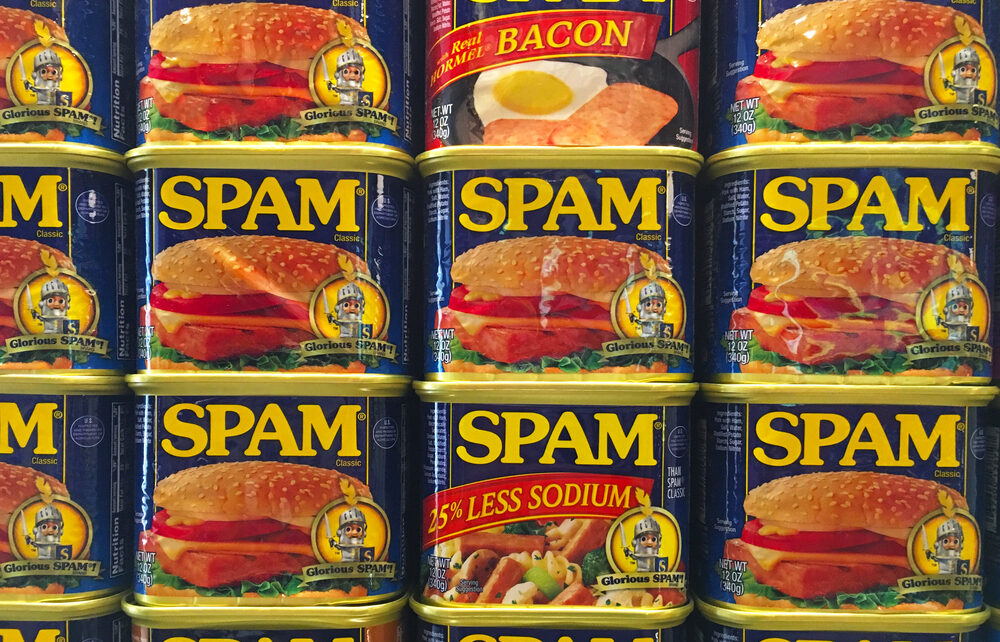Is Spam keto-friendly? It’s a question many people ask, but unfortunately, the answer isn’t so clear cut. While some think that the high sodium content of Spam makes it an unsuitable choice for a low-carb diet, others are more optimistic about its potential health benefits. To get to the bottom of this debate, we need to look at the nutritional facts and see how Spam stacks up against other popular keto-friendly foods.
Read on below to find out the answer to this and many more questions.
What Is Spam Anyway?
Spam is a canned precooked meat product made by Hormel Foods Corporation. It’s a combination of pork shoulder, ham, and other ingredients such as water, salt, sugar, modified potato starch and sodium nitrite that’s been cooked in its own juice and sealed in a can for preservation. For those of us unfamiliar with Spam, the taste may be an acquired one – it’s salty, slightly sweet, and usually served cold or warmed up.

Spam may not have the most appealing flavor profile to some people (but I love it!) but its convenience makes it a popular choice for quick meals.
There are also several similar products that may not be marketed under the Spam brand umbrella but are basically the same thing, such as luncheon meat or other canned meat varieties.
Spam Nutrition Info
With regards to nutritional content, a 3-ounce serving (85 grams) of Spam Classic contains the following:
• Calories: 190
• Total fat: 16 g
• Saturated fat: 6 g
• Trans fat: 0 g
• Cholesterol: 45 mg
• Sodium: 790 mg
• Carbohydrates: 1 g
• Protein: 10 g
With that in mind, you can see that classic Spam technically fits into a keto diet, as it contains very few net carbs. However, the high sodium content is something to be aware of if you’re trying to keep your salt intake low. That said, it may not be an ideal food choice for people who are on a strict diet due to its high sodium content and a fairly high saturated fat content.
Is Spam Good or Bad for You?
The debate about whether or not Spam is a healthy food has raged since it first hit store shelves in 1937. With its convenience and economical price, Spam has remained popular through the decades despite continued questions about whether it is good or bad for you.
When looking at the nutritional information, there are both benefits and drawbacks to eating Spam. On the plus side, it is an excellent source of protein (7 grams per serving) and contains no trans fats. It also has a relatively low fat content – 7 grams total – which is mostly unsaturated fat. In terms of vitamins and minerals, while Spam does contain some B vitamins and folate, as well as other micronutrients such as zinc, iron, and magnesium, overall its nutrient content is considered low compared with other protein sources like lean meats such as chicken or fish.

The downside to eating Spam lies primarily in the additives used to make it shelf-stable. These include sodium nitrite (to preserve color and flavor) and monosodium glutamate (MSG). Both ingredients have been linked to certain health risks, including high blood pressure and kidney problems in some people who are sensitive to them.
The amount of sodium in a serving of Spam (780 milligrams) can also be concerning for those watching their salt intake. Given all this information, it’s clear that people should weigh the pros and cons before deciding if they want to incorporate Spam into their diet. Moderate amounts consumed occasionally may not pose any major health risks; however, if eaten on a regular basis over time it is likely that there could be negative effects on one’s health due to the high levels of sodium and additives contained in this product. Therefore moderation should be key when considering adding this processed meat product to your diet regimen, or others such as corned beef.
How To Eat Spam On Keto
Wondering what are some of the best ways to enjoy Spam as a keto dieter? Here are some ideas:
- Spam Fried Rice (without the rice): This dish is a low-carb take on the traditional fried rice dish. Simply cook some diced Spam in a pan with butter or oil, add some diced vegetables such as cauliflower or broccoli and cook until tender. Then add in some beaten eggs and cook until set. This dish can be seasoned with soy sauce or coconut aminos for added flavor.
- Spam and Egg Breakfast: A classic breakfast dish that can be made keto-friendly by using Spam instead of bacon or sausage. Simply slice the Spam and fry it in a pan until crispy. Serve it with scrambled or fried eggs for a high-fat, protein-packed breakfast.
- Spam Lettuce Wraps: A great way to add some variety to your lunch or dinner. Simply slice the Spam into thin strips and fry it in a pan until crispy. Serve it on a bed of lettuce leaves and top it with your favorite keto-friendly sauce.
- Spam and Vegetable Skewers: Skewers are a great way to enjoy Spam in a different way. Cut the Spam into cubes and skewer them with your favorite vegetables, such as bell peppers, onions, mushrooms, and zucchini. Grill them until the vegetables are tender and the Spam is heated through.
- Spam and Cheese Roll-Ups: A tasty and convenient snack that can be made in a jiffy. Simply slice some Spam and cheese and roll them up together. These roll-ups can be eaten on their own or dipped in keto-friendly dips such as sour cream or guacamole.
It’s important to keep in mind that the key to incorporating Spam into a ketogenic diet is moderation. Spam is a processed meat, it’s high in sodium and saturated fat, which can be considered unhealthy ingredients when consumed in excess (possibly leading to a dirty keto diet). Therefore, when incorporating it into your diet, it’s best to limit the amount you consume and to be mindful of the rest of your diet to ensure that you’re getting the right balance of nutrients.
Final Words- Is Spam Keto Friendly?
When you’re in a pinch for time or want to try something out of the ordinary, Spam can easily come to the rescue for you. While it may not be the healthiest food option, if eaten in moderation and combined with a healthy diet, Spam is keto-friendly and can easily fit into the lifestyle. It will not knock you out of dietary ketosis in moderation.
So don’t be afraid to go ahead and give it a try!



